How to hang on to your sanity for the next few months
Brexit will be a long process, with little of any substance said about it in the next few months. Instead, John Stepek looks at six things that do matter.

Get the latest financial news, insights and expert analysis from our award-winning MoneyWeek team, to help you understand what really matters when it comes to your finances.
You are now subscribed
Your newsletter sign-up was successful
Want to add more newsletters?

Twice daily
MoneyWeek
Get the latest financial news, insights and expert analysis from our award-winning MoneyWeek team, to help you understand what really matters when it comes to your finances.

Four times a week
Look After My Bills
Sign up to our free money-saving newsletter, filled with the latest news and expert advice to help you find the best tips and deals for managing your bills. Start saving today!

This week, Brexit moved closer to reality. Prime minister Theresa May triggered Article 50.
I honestly don't have much to say about it at this point. It's going to be a long process. There will be ups, and there will be downs, and there may be ins and outs as well.
In the long run, I believe that this will be a good thing, and that the country will benefit economically over time. But it's not all about economics and it's certainly not all about share prices. From here, this is going to be long-term background noise. Other factors will take more prominence in moving markets.
MoneyWeek
Subscribe to MoneyWeek today and get your first six magazine issues absolutely FREE

Sign up to Money Morning
Don't miss the latest investment and personal finances news, market analysis, plus money-saving tips with our free twice-daily newsletter
Don't miss the latest investment and personal finances news, market analysis, plus money-saving tips with our free twice-daily newsletter
We'll keep you up to date on the important bits as they happen.But in the meantime, it's really just a speculative slanging match between commentators on the "Leave" side and those on the "Remain" side.
So if you're on any sort of blood pressure pills and have any view at all on Brexit (one way or the other), then I'd advise avoiding the comment sections of the newspapers for a while.
They'll only annoy you, while at the same time, delivering you absolutely zero informational value whatsoever. Empty calories for the brain. Like I said, we'll keep you up to date on anything that actually matters.
There is one thing I would flag up. I've noticed a bit of comment about the Bank of England being too scared to move rates because of the stick it would take from "Brexiteers" if it raises rates and then things go pear-shaped.
I think this is nonsense, I have to say. If inflation goes much higher than it is now, the Bank will struggle to look through it, given how low rates currently are. There are two years to go before Brexit actually happens. The Bank's not going to hold fire for that entire period, particularly once the daily news cycle gets bored.
I don't expect interest rates to rise by much (not yet, at least). But I can certainly see the post-Brexit vote emergency rate-cut being reversed at some point before the year is out. And I suspect that, given their hostility to the cut in the first place, Brexiteers would probably be quite happy to see rates rise.
An update on the six charts that matter
Speaking of things that actually matter, let's take a look at those charts we're monitoring we now have six of them.
Gold
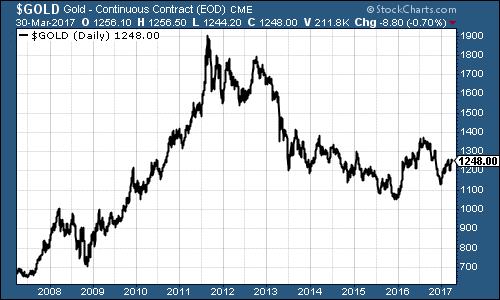
Gold had a bit of a wobble a few weeks ago, but when the Federal Reserve took a more relaxed tone with the markets, it rebounded strongly, on the belief that the Fed will stay behind the curve'.
This week, though, the Fed has talked up prospects for a rate hike again and as a result the dollar has rallied somewhat (see below) and gold has dipped. But it's still pricing in a Fed that won't act too aggressively to curb inflation, and I suspect it's correct to do so.
US dollar index
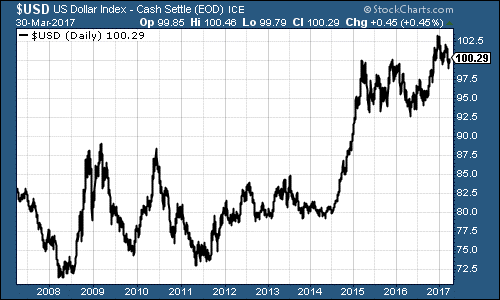
The dollar has taken a bit of a pummelling in recent weeks, partly as a result of the Fed's relaxed tone, and partly because the market is starting to realise that if Donald Trump wants to get anywhere, he's likely to want a weak dollar policy. We'll see how much the Fed talks it up in the coming days but I can't see the central bank being desperately keen to drive the dollar a lot higher from here.
Ten-year US Treasury bonds
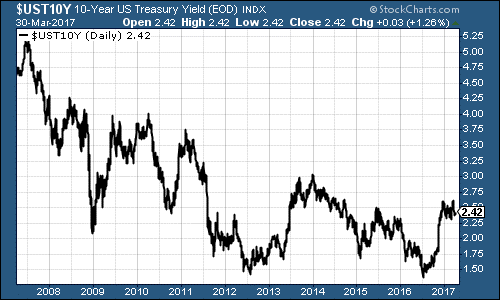
These have backed away from the line of no return - around the 2.6% yield area - as investors have started to lose confidence in the Trump trade'. With the healthcare vote (or lack of it) turning into such a resounding failure, markets need Trump to come up with something that works or the reflation' trade could fail, and yields go even lower from here.
Copper
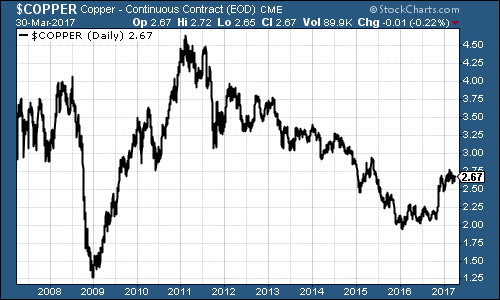
Copper has been pretty stable in the last few weeks. Even as markets fear the US won't be able to push through all the lovely tax cuts and infrastructure spending that Trump had promised, China has been stimulating its economy. So commodities are still a popular trade. If the Trump trade stalls fully though - or China reins in its stimulus once again as local property markets overheat - we'll see how long that can survive.
Bitcoin
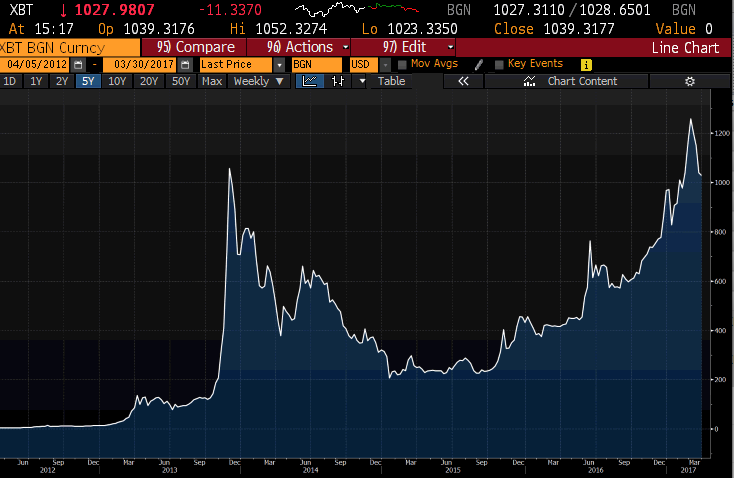
Bitcoin is undergoing something of a schism at the moment, and that's having an impact on the price. It's hard not to discuss it using the sort of language you might reserve for religious splinter groups, because bitcoin inspires that kind of devotion.
My colleague and alternative finance specialist Ben Judge delves into bitcoin's hard fork' and what it could mean for the digital currency in the latest issue of MoneyWeek.
But the long and the short of it is that bitcoin needs to evolve if it ever wants to go mainstream. However, the most powerful players in the bitcoin world can't agree on how to go about doing that. One set want to do it one way, and another set want to opt for a different solution.
It may still all pan out for the best. But the splintering doesn't bode well for the prospects of getting normal' people excited about using a technology that they already see as pretty flakey - particularly as the whole point was that it was meant to be all about decentralisation and not having a higher authority in charge of things.
US jobless claims
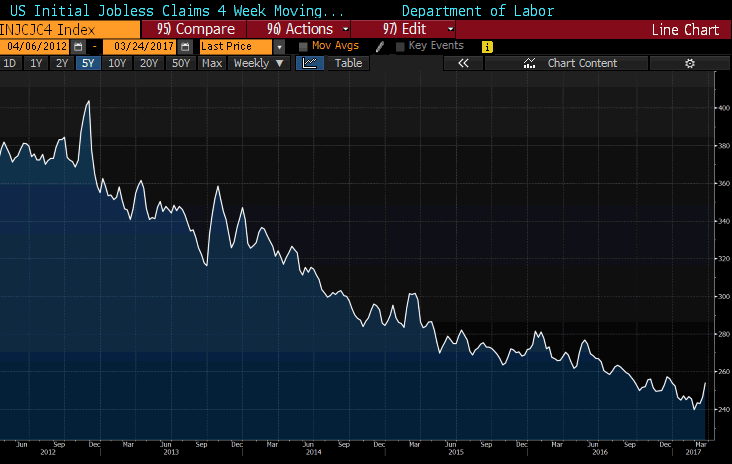
I noted last week that David Rosenberg of Gluskin Sheff reckons they're a valuable leading indicator. He notes that they may have hit a "cyclical trough" (as measured by the four week moving average) at the end of February. If that holds, then the S&P 500 could be close to running into trouble.
Rosenberg reckons that on average, the S&P 500 peaks 14 weeks after the bottom (so in this case, that'd be roughly the end of May) and you get a recession after 57 weeks.
I don't know whether that'll be the case this time - and obviously there really aren't a lot of prior examples to draw from - but Rosenberg is a smart man and it's certainly an indicator to keep an eye on. So here it is.
Some light weekend reading for history buffs and market psychologists
I've read a few other good things this week that the more technically-minded or patient among you might want to take a look at. I've mentioned the key points from most of them in previous Money Mornings or in the magazine, but if you have the time, it's often interesting to look at the source material.
There was James Montier of US asset manager GMO's "Six impossible things before breakfast." (Thoughtful people working in finance seem to be very fond of Alice in Wonderland I've noticed. It may be because the metaphors lend themselves to a world - the financial one - that is superficially logical, but in fact crammed with absurdity).
Anyway, behavioural investing expert Montier outlines why he basically disagrees with his employer's house view on equities. GMO seems to have reluctantly embraced the idea that we could be stuck in a new normal' of permanently lower interest rates, and as a result, equities may not be heading for a crash any time soon.
Montier begs to differ, and pulls out six "impossible" ideas that you have to believe to "make sense of today's pricing".
It's a bit technical, but he makes some good points about corporate cash piles being less vast than people generally believe and disputes the idea that just because interest rates are low, equities should automatically be high.
He also describes equities as being "hooked on crack", which as far as I can remember, is not an Alice in Wonderland quote. Here's the piece: Six Impossible Things Before Breakfast.
(He's also written a belter of a piece on populism, with a colleague, Philip Pilkington check that one out here).
Another good one, if you fancy a dig through some depressing history and some choice quotes, is hedge fund Bridgewater's dense 60-page primer on populism. I haven't ploughed through it all yet and I know for a fact that many of you are far more knowledgeable historians than I am, but there's some interesting stuff in there.Populism: the phenomenon.
Finally, there's the Michael Mauboussin report I covered in this week's MoneyWeek strategy page. The Credit Suisse analyst is a highly respected observer of human behaviour and what it means for how markets really work. He and his team have turned their attention to the perhaps surprising fact that the number of stocks listed on equity markets in the US has fallen in half over the last 20 years.
Again this one is pretty technical and maybe not something you need to read if you are happy enough with my discussion of it in MoneyWeek. But for those of you who want to dig into the details, it's worth a look.The Incredible Shrinking Universe of Stocks.
Get the latest financial news, insights and expert analysis from our award-winning MoneyWeek team, to help you understand what really matters when it comes to your finances.

-
 Can mining stocks deliver golden gains?
Can mining stocks deliver golden gains?With gold and silver prices having outperformed the stock markets last year, mining stocks can be an effective, if volatile, means of gaining exposure
-
 8 ways the ‘sandwich generation’ can protect wealth
8 ways the ‘sandwich generation’ can protect wealthPeople squeezed between caring for ageing parents and adult children or younger grandchildren – known as the ‘sandwich generation’ – are at risk of neglecting their own financial planning. Here’s how to protect yourself and your loved ones’ wealth.